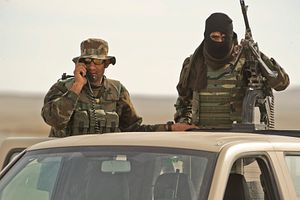General John W. Nicholson, Commander of Operation Resolute Support and U.S. Forces Afghanistan, conducted a press briefing at the Pentagon Friday afternoon where he gave cautious optimism for Afghan forces.
Describing the success of Operation Shafaq, launched by Afghan forces this spring to counter the Taliban Operation Omari, the General stated:
So, this campaign has essentially been on plan through the end of July and it was — the three phases we ran to that point, number one, which was the defense of Kunduz that occurred in April and May in which the Afghans successfully defended against another Taliban attempt to take that city. They then shifted their main effort to the south to Helmand, Western Kandahar, Uruzgan to expand their security zone in the south. Again, this was conducted successfully in the June, July timeframe.
And then, in late July, they shifted their effort to Nangarhar to the east to conduct counter-ISIL operations, counter-Daesh operations. These operations were very successful. They were conducted by Afghan Special Forces enabled by U.S. counter-terrorism forces and these succeeded in killing the top 12 leaders of Daesh to include there Amir , Hafasayad Khan, and trading roughly 25 percent of the organization of their fighters and reducing their space in Nangarhar.
The General further added that based on his assessment the Afghan government currently controls 70 percent of the population while the Taliban only control 10 percent with the remainder contested between the two warring parties. According to Nicholson, Afghan security forces have succeeded this year in protecting major population centers, and foiling Taliban strategic objectives this fighting season.
However, the partial success of Operation Shafaq has come at a high cost with rising casualties for Afghan security forces. The Resolute Support commander contributed the rising casualties to Afghan security forces’ reliance on manned checkpoints, a problem he described as both tactical and political.
Fielding questions from reporters Nicholson quipped, “So, we believe that with improvements in leadership and a system like supply systems and so forth and through a reduction of dependency on check points, that this will reduce the potential for casualties. This is where many of the casualties have been suffered in a small, you know, 30 to 50 man checkpoints. They get overrun by a larger enemy force.”
Nicholson further added, “And then what’s happened when the enemy’s attacked is the technique that they use is to attack specific checkpoints, typically along highways. and then what we see if an effective use of information ops and PSYOPS, psychology operations, by the enemy against these checkpoints in which they will — they might overrun a checkpoint and then call the next checkpoint and tell them, “If you leave, we’ll leave you alone.”
According to Nicholson, the issue surrounding check points is both political and poor leadership. Local political leaders pressure security forces to man and maintain hundreds of hard to defend checkpoints to bolster the appearance of security for their local constituencies. Furthermore, poor leadership by local commanders results in improperly equipped and informed checkpoints, which results in effective psychological operations by the Taliban.
When checkpoints are attacked or abandoned by security forces, local political leaders phone media and news connections with exaggerated stories to force further action by Kabul or to obtain further support by U.S. forces, according to Nicholson this is what happened in the recent siege of Tarin Kot.
A recent report by Pajhwok appears to underline this phenomenon. According to the governor of southern Helmand, Hayatullah Hayat, Afghan security forces and police abandoned 150 posts to the Taliban without a fight.
“If these forces were national, they would have listened to the governor and their commander, we are tired of telling them not to do this and that, but they ignore us and do what those who have appointed them say,” the governor said.
The governor further warned that forces abandoning their posts would be referred to attorneys for punishment.
It is unknown whether these posts were abandoned to consolidate forces or as a result of corruption. However, the report highlights a significant problem with Afghan security forces and that is the influence of local governance on tactical situations that should be determined by local commanders.
































